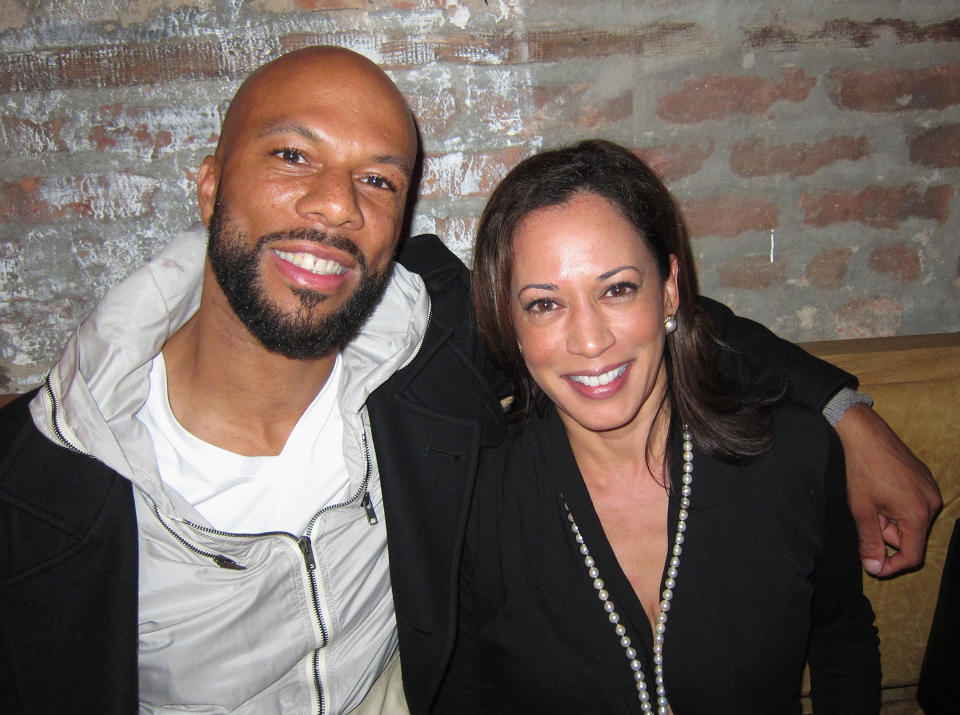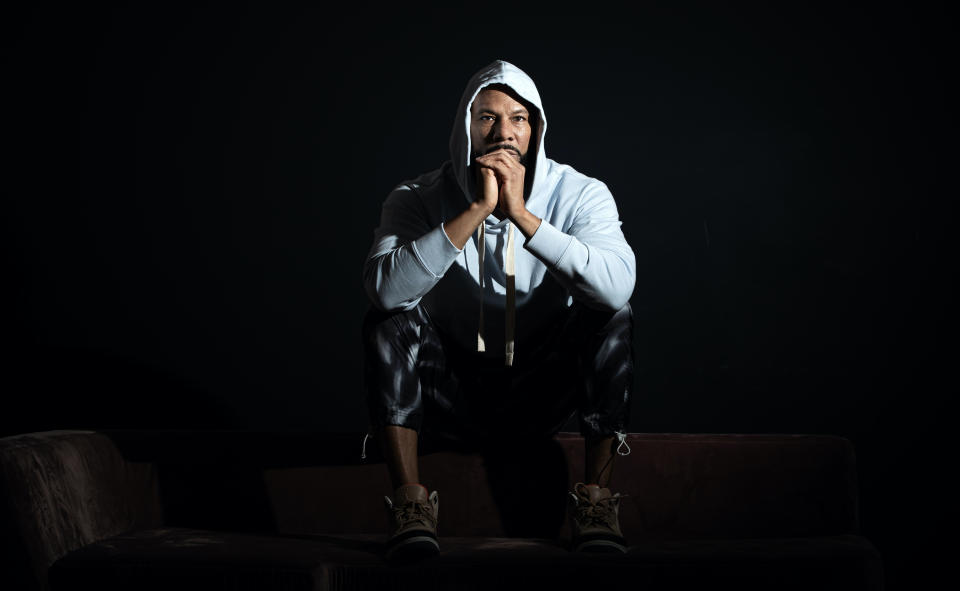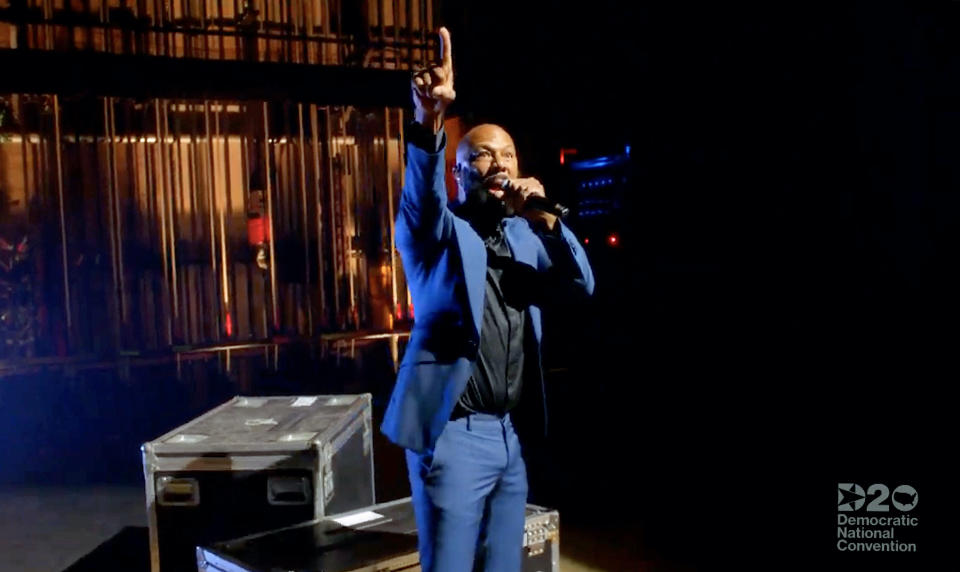Common on racial bias in education: 'We won't see equality if we're not teaching our children the full story'
Oscar- and Grammy-winning rapper, actor, writer and activist Lonnie Corant Jaman Shuka Rashid Lynn, better known as Common, is one of the most socially conscious music artists working today, and he’s also the son of a former high school principal. So, he was the perfect fit to teach an online class for Varsity Tutors’ Social Conscience Series, a free online curriculum aimed at eradicating systemic racism and sexism and driving social change. Common’s class, originally streamed live on Sept. 23 and now archived to watch on demand, was designed to “teach what schools do not” and help young people find their true voices.
Yahoo Entertainment caught up with Common to discuss his involvement in the Social Conscience Series; racial bias in American schools; his fears and hopes for the next generation; the pitfalls of social media; his recent salute to the late John Lewis on the final night of the 2020 Democratic National Convention; his excitement over the prospect of electing Kamala Harris as the first Black, female vice president; and how he stays hopeful during such dark times.

Yahoo Entertainment: I know the purpose of your Varsity Tutors’ class is to help young people find their own voices. Kids can very impressionable, and I worry about them modeling what they see out there on the news and social media — a total lack of empathy, a lack of consequences for wrongdoing, etc. I’m wondering how your lesson can help offset that bombardment of negativity.
Common: Well, I actually believe that the youth have a great grasp on compassion and understanding and empathy for others. When I look at how young people integrate and how they include more people that are not like them or are more open to the LGBT community or more open to people from different spiritual practices … it just seems like young people have a freedom in them that is what America has talked about and written about, but has never really lived up to.
I do believe that the new generation, the younger generation, is living it organically; they fight against the old ways, that old mentality. That’s what we see happening. When you look at the Breonna Taylor case, when you look at some of the systems set up, that is the old ways of thinking — like, “Oh, like people in power want to keep certain people like second-class citizens,” just oppress and oppress. Yes, I do know there are some young people like that young man in Wisconsin who did kill some people in the protests. There are some young people that may succumb to the negative energy out there.
But overall, I feel there are a lot of great young leaders, and what this class is doing is just reinforcing and supporting and encouraging them to follow their hearts and find what that means, and understanding that every individual on this planet has a purpose. It is your duty to find what that purpose is and to express that, and to use it towards bettering society. That’s what the core of it was. And the reason I feel like it could be effective now is because it was coming from a pure place; it was coming from an honest place in my experiences. It also was really giving A-to-B steps to find that voice to finding the happiness. Now the individual is going to have to take those steps, but I think it’s an empowering thing.
What do you think is the greatest challenge facing the young generation, or what is your biggest fear for them in their future?
I think the one of the biggest obstacles is the influence of social media upon one’s purpose and path. I mean, social media can be used for a lot of good things, and it has, but I think psychologically, the biggest challenge that they face is really understanding that. It’s not good for you to give energy towards negative comments, or honestly, even to compliments and “likes.” On social media, strangers are able to talk about what you are doing and what your vision or your dream may be, or who you are, and they really don’t understand you and may not have compassion — but you’re hearing what they’re saying. That’s not healthy because you don’t know where they’re coming from, you don’t know what issues they got.
And then there’s the challenge of actually being able to socialize and connect, especially with the new ways that we function in this world. Young people still have to be able to connect socially and be around each other and be in each other’s presence. Man, it used to be that you had to work up your nerve to ask the girl out on a date! It’s something that builds character. So I think with the new social norms, we still need to have some of those character-building exercises.

I know that your mother has a background as an educator. I’m curious, on the subject of “teaching what schools do not,” about what you think about education in this country in general — because frankly, I look back on my own schooling and I’m appalled about what I was not taught. I was not taught about Tulsa or Rosewood or Emmett Till. I was taught that the Pilgrims at Thanksgiving were nice to the “Indians.” I was taught that Columbus discovered America, and that Thomas Jefferson was a “nice” slaveholder. I was taught a lot of things that were very xenophobic and problematic. What are your thoughts about that bias in the U.S. education system?
I see it changing as we speak. More and more, [schools] are implementing classes that deal with social justice — including more things that deal with, honestly, Black culture. I was blessed to go to a school where my teacher did teach me about Emmett Till, and that changed my life, to be honest. And I think now it’s out in the open, everything is out, everything is out there. Many people are aware of stuff and some might not accept the facts of it, but it’s the truth.
And a lot of educators know that we won’t see equality if we’re not teaching our children full the story about other people who contributed — not just white men, but showing who the natives were in this country and what their traditions are, and honoring that. And showing what Black people have done in this country and on the planet. And [teaching about] Latino people and Muslims. Just basically acknowledging the world the way it is. I believe that’s what education is. It hasn’t 100 percent come into that place, but it’s definitely going in that direction. There are enough places in schools that are doing that, and people are taking it upon themselves to make sure that their children get that type of awareness.
I have to ask you what it was like to perform at the Democratic National Convention a few weeks ago. That must have been a huge thrill and emotional moment for you, especially since you were part of the salute to John Lewis.
It was an incredible honor to be able to be a part of that tribute and to be there for the Democratic National Convention. I’m truly a believer in going out and making sure we support candidates who at least stand up for human beings and speak up. Even if I don’t agree with everything that a politician is doing, I like to see people who believe in compassion and have empathy for human beings, and can and will express that in their leadership roles.
So to be able to support the Democratic National Convention and be a part of that, and then as part of the John Lewis tribute, I felt like we were carrying that spirit and that energy, because Glory was written about the civil rights movement and for the film Selma, which was about John Lewis and Dr. King and Andrew Young and Ralph Abernathy and Diane Nash and so many great people. To be able to perform that in this day and age, it applied to what’s going on now. It felt incredibly good. I was grateful to do it.

What are you doing to get out the vote?
I’m part of something called Urgency 2020, where we’re really identifying candidates that are really for the people and are going to go out and support them. These are people down the ticket in certain swing states, truly good people running for office. Because, listen, obviously politics has its issues because of what it had been based in, but there are good people that are politicians too, people that are true leaders. So I want to make sure that we identify [those candidates] and also be a sounding horn, for those voters who may not go out and seek that information. Alicia Keys is involved, Seth Rogen. It’s a powerful thing.
Obviously next month is not just about the presidential election, but all eyes are on Trump and Biden. I know you were very involved with the Obama administration — for instance, in 2016 you performed at BET’s Obama celebration and did an NPR Tiny Desk Concert at the White House. We look back just four years ago and see what a different presidency we had then. Where’s your head at, in terms of staying hopeful and positive as the election nears?
My head is … it’s my duty. It’s my responsibility to hold myself accountable, to make sure that I’m going out and not only voting myself and being educated about it, but also amplifying that message and encouraging people that may be apathetic to realize how important it is right now. And I am hopeful. I believe that the opportunities, the chance to get a new administration in — not just from the presidential standpoint, but with our vice president. It’d be incredible to see a Black woman as vice president, and to see a new president — but also [changes] in the Senate, so that the president can do things, so the president can be effective.
So basically, I am hopeful. It’s going to take a lot of work. We’ve got to do a lot to spread love. I believe we as people have to do everything we can to make sure that we go out and vote and support the right candidates — and then we also still have to do the work on ourselves and work with our communities that exist outside of politics. Politics affects us every day because it’s on every level, but there are also certain things like spirituality and the way we treat our families and treat ourselves. Those things that we still have to work on, no matter who’s the president. But at this moment, I am focused on going out there and getting a new administration in there.
The last four years, particularly this year, have been rough. It’s easy to experience outrage fatigue and become apathetic.
Yeah, it has been rough. But I had to put my faith in the people and God. That’s why I have these different outlets to do things, whether it be meditation, prayer, watching good films — different things that help me connect with people on a positive note. We still have the opportunity to do good in the world, with the nonsense that is going on. We don’t have to succumb and just focus on the negative things. We have to acknowledge that that negative things exist and combat them, but part of combating them is going out and doing good in areas where good needs to be. We gonna be all right. In the words of Kendrick Lamar, we gonna be all right.
Read more from Yahoo Entertainment:
Queen Latifah on affecting social change: 'I feel we're in a pivotal place'
Chuck D talks Public Enemy’s incendiary new anti-Trump song: 'This dude has got to go now'
Follow Lyndsey on Facebook, Twitter, Instagram, Amazon and Spotify


